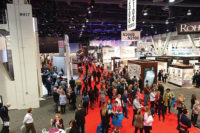
Robert J. Sapienza Sr.
Imagine a bathtub that will last 30 years but is so lightweight you can load eight or nine at once, nested together on one pallet. German-based manufacturer Kaldewei says the 3.5 mm steel enamel it uses for its bathtubs and shower bases is produced without pollution, recyclable and clean enough to eat off.
Supply House Timesinterviewed Kaldewei’s VP of sales, North America,Robert J. Sapienza Sr., to talk in-depth about green products.
Supply House Times: Please share some background information about Kaldewei overall and its North American operations.
Sapienza:Our products are environmentally friendly from cradle to grave, including the manufacturing facility in Germany, product components, life expectancy and recycling of the products. We are the only plumbing company in the world to be ISO 14025 certified and are also IBU (German green building standard) certified. Fusing together enamel and steel, the material for our tubs and shower bases is fired at more than 1,500 degrees F, into a unique steel enamel that is virtually indestructible. The process used in firing the product and the raw materials used are green. Steel is recycled and enamel is natural, basically the same minerals found in glass. The material is non-caustic and can be completely recycled. Eight or nine tubs can be stacked vertically on a pallet, nested together with cardboard and foam, for delivery. Our factory is green in terms of water efficiency. We do not create waste or pollution. We are always thinking about how to make something better, cleaner, stronger, and not hurt Mother Nature while doing it.Q: Is the retail or wholesale market more receptive to “green” products? Does Kaldewei deal with buying groups or Internet retailers?
Sapienza:The green movement has crossed into both segments, but Kaldewei is more focused on the wholesale trade. Consumers are seeking green products but don’t know how to evaluate them. Plumbing wholesalers have a better understanding because of LEED. Retailers tend to focus more on the function being green vs. the product itself. They don’t look at the before and after, or savings in overall household costs, except for tax credits.Kaldewei sells through traditional plumbing wholesalers and high-end kitchen & bath boutiques, but not through DIY stores or cash-n-carry outlets.
We are not currently involved in any buying groups but are evaluating and will probably be involved in the future. We want to align ourselves with the right partners.
We also have a small group of Internet retailers and one mass distributor. They are required to limit discounts and sign an IMAP letter to sell our product online. Any responsible manufacturer has to set boundaries to make sure his product is delivered and sold at a fair margin so the brick-and-mortar companies can compete.
We find that customers shopping for a bathtub or shower are more likely to go to a wholesaler versus shop online because they want to see and touch it.
Q: What are the demographics of the typical “green” customer?
Sapienza:They tend to be more upscale and invest more money up front in building. They are more socially responsible - seeking long-term savings and the ability to recycle. Kaldewei’s tubs can be recycled, plus we provide a 30-year warranty on our products. The bathroom can be updated with new tile or a new vanity or faucet, but the tub will stay in place.Q: What product features do “green” customers consider most important?
Sapienza: They want definable, measurable green characteristics. We have third-party documentation that our products are green. They also want style and performance. Our designs are created by the Italian design studio Sottsass Associati in Milan, Phoenix Design in Stuttgart/Tokyo, and in-house. We look for timeless design.Q: How much more are people willing to pay for “green” products?
Sapienza:There isn’t really one answer. Some green products have a simple payback, such as lower utility bills. The customer has to see the value and make a judgment. It’s a personal decision. If a tub will last 30 years and has style, that represents a value to the customer. In general people are willing to pay a little more to know they are doing something right for the environment and their living space without sacrificing style.Q: Do low-flow environmental restrictions present any special difficulties?
Sapienza:Our products are bathing wells so flow is not an issue. We are conscious of how much water is needed to fill the tub and do not create super deep tubs. Because of the glass material of our tubs, they are safe enough to drink from, though I’m not recommending that. The surface is non-porous and anti-bacterial by nature. Nothing - including toxic chemicals - sticks to it. Our shower base offers no place for bacteria to hide.

